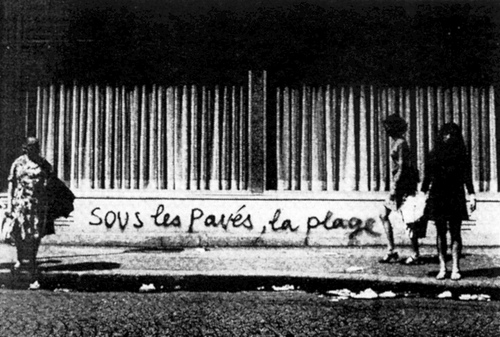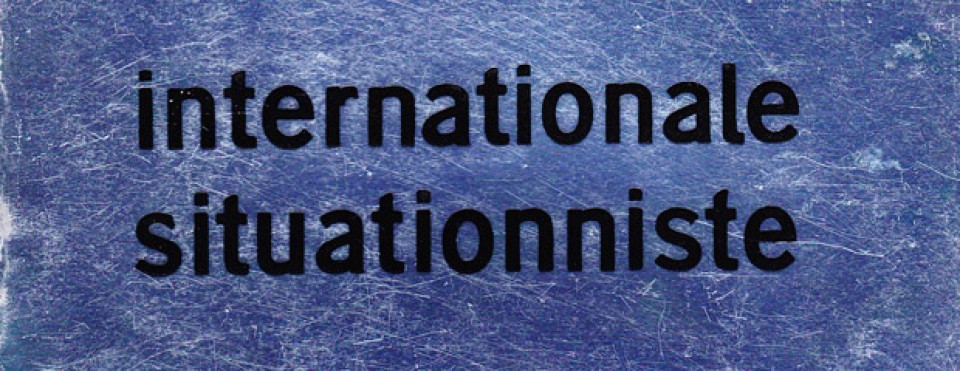WOUNDED GALAXIES
1968: Beneath the Paving Stones, the Beach
Festival + Symposium

Feb 8-10, 2018
Indiana University
Call for Papers
The Sixties were a turbulent period, characterized by major revolutions in scholarship, politics, culture and the arts. Indiana University, in conjunction with The Burroughs Century, plans an academic symposium welcoming scholars, archivists, filmmakers, and others interested in exploring the intellectual and aesthetic legacy of 1968, during its 50th anniversary year. The conference will be held on the beautiful Bloomington, Indiana campus and will be hosted by Indiana University’s Media School; the Indiana University Libraries (including the Lilly Library and the IU Libraries Moving Image Archive); and Indiana University Cinema, which has earned an international reputation for the high quality of its facilities and programming.
Accompanying the symposium will be a series of films and an exhibition featuring rare and unique items from the IU Library collection. Renowned scholars such as Greil Marcus McKenzie Wark, and, possibly, Penelope Rosemont are expected to give talks, introduce films, and appear in Q&A sessions following screenings.
In addition, we are planning an art exhibit, as well as series of experimental music performances and spoken word presentations, in keeping with the larger theme of radical aesthetics. We plan to publish the conference proceedings.
Interested participants are invited to submit paper proposals on any aspect of the international history and cultural legacy of 1968. Papers need not be limited to any particular critical, theoretical, historical, or political subject or method. We hope to receive proposals that deal with previously unexplored issues, but we are also interested in proposals that offer fresh approaches to much-discussed work. As the symposium title suggests, we are using the Situationists as a point of departure and particularly welcome presentations that consider the revolutionary potential of the Everyday—in both historical and contemporary situations.
But we are happy to consider any proposals that address the historical legacy of 1968, and welcome submissions that attempt to trace the legacy of 68 in contemporary art and culture.
Possible topics include but are not limited to:
- history and historiography of 1968;
- the post-1968 generation and terrorism;
- post ’68 science fiction;
- anthropology and the Situationists;
- architecture after ’68;
- counter/sub-cultures after ’68;
- literature and literary theory;
- The Annales school and radical shifts in historiography
- Marshall McLuhan and the electronic revolution
- The history and legacy of the Black Panther Party
- Chicago 1968
- The International Student Movement(s)
- Revolution and the University
- Prague Spring – experimental & avant-garde art, film, literature & music made during this period of freedom; the avant-garde going underground during Normalization; lingering impacts of Prague Spring on experimental & avant-garde art/music/lit/etc.
- Surrealisms outside France – the internationalization of surrealism that happened in the late-60s onward (U.S., African surrealisms, Poland’s “Orange Alternative”, etc.)
- Neo-Dada and Fluxus
- French New Wave cinema and its response to the events of Mai-
- Third Cinema(s)
- East vs. West perspectives: pro-socialist avant-gardes in the West Europe versus anti-socialist avant-gardes in East Europe
Proposals should be limited to 300 words in length and consist of a brief description of the paper’s theme or focus, plus a one-page vita. Proposals may be submitted for individual papers or for sessions featuring two or three panelists. Proposals for panels should be submitted as a group by the organizer, along with a short explanation of the unifying theme. In addition, each panel proposal should consist of individual paper descriptions (limited to 300 words in length), names of panelists and their vitae.
Please email your proposals to Joan Hawkins jchawkin@indiana.edu, by July 1, 2017. The Symposium Program Committee will evaluate all submissions and notify all candidates of the results by Aug 1, 2017. . We look forward to your proposals, and to celebrating/reevaluating the legacy of international political and aesthetic upheaval.
